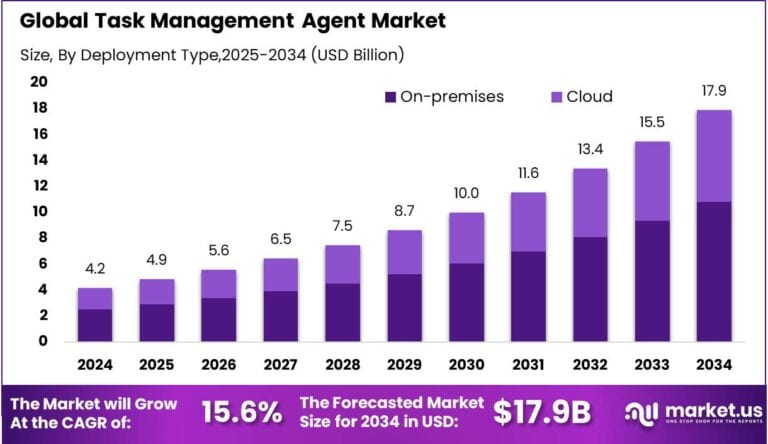Table of Contents
Introduction
The task management agent market is forecasted to grow significantly, reaching USD 17.9 billion by 2034 from USD 4.2 billion in 2024, with a CAGR of 15.6%. North America dominated the market in 2024, capturing 34.5% of global revenue at approximately USD 1.44 billion. The U.S. segment was valued at USD 0.43 billion, growing at a CAGR of 16.7%, fueled by the increasing adoption of intelligent automation in enterprise workflows. This growth reflects enterprises’ drive to enhance productivity and streamline complex task management through AI-enabled agents and automation technologies.

How Tariffs Are Impacting the Economy
Tariffs have introduced notable challenges to the global economy by increasing costs on imported goods and components essential for manufacturing and technology sectors. Elevated tariffs raise production expenses, contributing to inflationary pressures that reduce consumer purchasing power and slow economic growth.
➤ Discover how our research uncovers business opportunities @ https://market.us/report/task-management-agent-market/free-sample/
(Use corporate mail ID for quicker response)
Supply chain disruptions caused by tariffs force companies to alter sourcing strategies, often incurring higher operational costs or delays. Additionally, trade tensions provoke retaliatory tariffs, escalating global uncertainty and volatility in trade flows. These economic dynamics constrain investment and innovation, affecting both domestic and international markets, including sectors relying on advanced automation and digital solutions.

Impact on Global Businesses
Global businesses experience heightened costs for raw materials and technology imports due to tariffs, compressing profit margins and slowing project timelines. Supply chain shifts require diversification or nearshoring, increasing operational complexity and capital expenditure. Industries like IT, manufacturing, and utilities are particularly affected, facing challenges in the timely procurement of advanced components for automation solutions. Market unpredictability caused by tariff fluctuations forces companies to adopt more cautious investment strategies. These pressures compel firms to innovate rapidly, optimize resource utilization, and reinforce supply chain resilience to sustain competitive advantage.
Strategies for Businesses
Companies adopt multiple strategies to navigate tariff impacts, including diversifying supplier bases to minimize exposure to tariff-heavy regions and localizing production closer to end users. Leveraging automation and predictive analytics helps optimize inventory and anticipate regulatory changes. Strategic partnerships and contractual adjustments distribute tariff-related risks. Additionally, digital transformation initiatives enhance agility, enabling businesses to adapt quickly to shifting trade policies. Engaging with policymakers through advocacy efforts also forms part of broader risk mitigation. Overall, agility, innovation, and strategic foresight are critical for thriving amid tariff-induced challenges.
Key Takeaways
- Task management agent market projected to grow at 15.6% CAGR through 2034
- Tariffs increase production costs and disrupt global supply chains
- Sectors like IT and manufacturing face significant operational challenges
- Businesses respond with supply diversification, localization, and automation
- Predictive analytics support strategic planning in volatile trade environments
➤ Get full access now @ https://market.us/purchase-report/?report_id=148762
Analyst Viewpoint
The task management agent market continues its strong upward trajectory, driven by increasing enterprise reliance on intelligent automation to improve efficiency. While tariffs impose cost pressures and supply uncertainties, they simultaneously accelerate digital transformation and adoption of AI-driven task management tools. This dual effect fosters innovation and market resilience. Going forward, technological advancements and strategic business adaptations will propel sustained growth. The market outlook remains positive, with expanding use cases and regional investments expected to drive widespread adoption globally.
Regional Analysis
North America leads the task management agent market with a 34.5% revenue share in 2024, benefiting from high digital maturity, robust IT infrastructure, and early adoption of automation technologies. The U.S. drives regional growth with significant enterprise investments in intelligent workflow solutions. Europe follows with steady adoption fueled by regulatory support for digitalization. Asia-Pacific presents rapid growth prospects due to expanding enterprise digitization and increasing automation demand. Regional differences reflect varying technology readiness and investment climates.
➤ Discover More Trending Research
- Small Arms Market
- B2B Travel Platform Market
- Digitalization of Power Distribution Market
- Sports Broadcasting Technology Market
Business Opportunities
The market offers diverse opportunities in sectors including IT, manufacturing, healthcare, and finance, where task automation improves operational efficiency. Demand for cloud-based, scalable task management agents is rising, driven by remote work trends and complex workflows. Emerging markets offer growth potential through digital transformation initiatives. Integration with AI and machine learning enables personalized and predictive task automation, opening avenues for innovative solutions. Collaborations between software providers and end-users facilitate tailored deployments and market penetration.
Key Segmentation
Component
- Software
- Services
Deployment Mode
- Cloud-based
- On-premises
Application
- Workflow Automation
- Project Management
- Resource Allocation
- Collaboration Tools
End User
- IT & Telecommunications
- Manufacturing
- Healthcare
- BFSI (Banking, Financial Services & Insurance)
- Others
Key Player Analysis
Market leaders focus on delivering AI-powered, user-centric platforms that enhance task automation and collaboration. Investment in R&D emphasizes improved natural language processing and integration capabilities. Scalability and flexibility through cloud solutions are prioritized to meet diverse enterprise needs. Expansion strategies include partnerships and acquisitions to broaden service offerings and geographic reach. Customer support and customization options help retain clients and enhance competitive positioning.
Top Key Players in the Market
- Microsoft Corporation
- Upland Software, Inc.
- Atlassian
- RingCentral, Inc.
- Pivotal Software, Inc.
- monday.com
- Asana, Inc.
- AZENDOO
- Quick Base
- REDBOOTH
- todo.vu
- Workfront, Inc.
- Zoho Corporation Pvt, Ltd.
- Evernote Corporation
- Meister
- Workfront, Inc.
- Others
Recent Developments
In 2025, major task management agent providers launched enhanced AI-driven workflow automation features. Strategic alliances with cloud infrastructure firms have expanded global reach. Additionally, new integrations with popular enterprise collaboration platforms accelerated adoption across key markets.
Conclusion
The task management agent market is poised for sustained growth, driven by digital transformation and automation demand. Tariff-related challenges encourage innovation and strategic agility, reinforcing market resilience. Continued investments and technology advancements will support widespread adoption and long-term expansion.


